The Boy King Tutankhamun: A Fascinating Mystery
Tutankhamun, often referred to as the “Boy King,” is one of the most famous pharaohs of ancient Egypt. His tomb, discovered largely intact in 1922, revealed a wealth of treasures and provided invaluable insights into the life and death of this young ruler.
A Brief Overview
Tutankhamun ascended to the throne at a tender age, likely around nine or ten years old. His reign was relatively short, lasting only about nine years. Despite his brief tenure, Tutankhamun’s tomb, found in the Valley of the Kings, remains one of the most significant archaeological discoveries of the 20th century.
The Discovery of Tutankhamun’s Tomb
The discovery of Tutankhamun’s tomb by British archaeologist Howard Carter in 1922 captivated the world. The tomb was nearly untouched and contained a staggering amount of treasures, including gold masks, jewelry, chariots, and even a throne. These artifacts provided a rare glimpse into the life of a pharaoh and the opulence of ancient Egyptian society.
The Mystery Surrounding Tutankhamun
Tutankhamun’s life and death have been shrouded in mystery. His early accession to the throne, coupled with his relatively short reign, has led to speculation about his role in Egyptian history. Some historians believe that he was a puppet king, controlled by powerful advisors. Others suggest that he played a more active role in governing the kingdom.
The Boy King’s Legacy
Despite his brief reign, Tutankhamun left a lasting legacy. His tomb provided invaluable insights into ancient Egyptian burial practices and the wealth and power of the pharaohs. The discovery of his tomb also sparked renewed interest in ancient Egyptian history and culture.
The Curse of Tutankhamun
One of the most enduring myths associated with Tutankhamun is the “Curse of Tutankhamun.” This belief, popularized by the media, suggests that anyone who disturbs the pharaoh’s tomb will be cursed with misfortune or even death. While there is no scientific evidence to support this claim, the deaths of several people involved in the excavation and study of the tomb fueled the legend.
The Life and Times of Tutankhamun
Although much remains unknown about Tutankhamun’s life, historians have pieced together some details based on the artifacts found in his tomb and other historical records. He is believed to have been the son of Akhenaten, a pharaoh who introduced a monotheistic religion worshiping the sun god Aten. Tutankhamun is thought to have reversed his father’s religious reforms and restored the traditional polytheistic worship of the Egyptian gods.
Conclusion
Tutankhamun remains a fascinating figure in ancient Egyptian history. His tomb, filled with treasures and secrets, continues to captivate the imagination of people around the world. While many mysteries surrounding his life and reign remain unsolved, his legacy as the “Boy King” will undoubtedly endure for generations to come.


